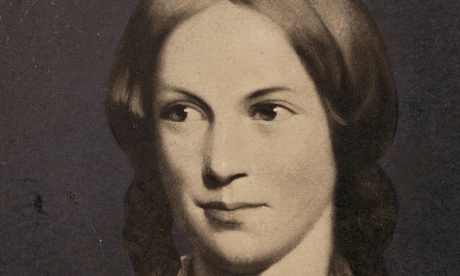School reports on writers deliver very bad reviews
Charlotte Brontë wrote 'indifferently', according to her teachers, and many another writer's gifts have been roundly trashed by their teachers

Charlotte Brontë in a c 1840 portrait by Thompson.
It's been a long time since I faced the terror of a school report myself, but it all came back after I landed upon this Slate article, pointing towardsCharlotte Brontë's. Made available online by the British Library as part of its fabulous new digital English literature resource, the write up is hardly glowing. Apparently, the girl who would go on to pen Jane Eyre "writes indifferently" and "knows nothing of grammar, geography, history, or accomplishments". The eight-year-old is, however, "altogether clever of her age", but "knows nothing systematically".
The report is taken from the school register of the Clergy Daughters' School, at Cowan Bridge, and published in the Journal of Education. It also mentions Emily Brontë, then aged 5 ¾, who "reads very prettily, and works a little", and, poignantly, Elizabeth and Marie Brontë, then aged nine and 10, both of whom left "in ill-health", and died later in 1825.
"Typhoid fever hit Cowan Bridge, leading to a number of deaths among its pupils, thought to have been exacerbated by the school's poor food and harsh regime," writes the British Library. "Maria and Elizabeth fell ill; after being sent home, they both died of tuberculosis in May and June, respectively. Shortly before Elizabeth's death in June, Charlotte and Emily were also removed from the school. The school's routine and conditions, combined with Charlotte Brontë's memory of her sisters' deaths, provided inspiration for Lowood School in Jane Eyre."
Charlotte Brontë is not the only author to have failed to receive a good send-off from school. Robert Graves writes in Goodbye to All That that, leaving Charterhouse, his headmaster's "parting shot" was "Well, goodbye, Graves, and remember that your best friend is the waste-paper basket". (Graves adds: "This has proved good advice, though not perhaps in the sense he intended: few writers seem to send their work through as many drafts as I do.")
Catherine Hurley has even compiled a whole book of school reports of the famous, Could Do Better – which is weirdly compelling. PG Wodehouse, at Dulwich College in 1899, was told "he has the most distorted ideas about wit and humour; he draws over his books and examination papers in the most distressing way and writes foolish rhymes in other people's books", and Helen Fielding, at Wakefield Girls' High School, that she "must learn not to use such flowery language".
The Wall Street Journal gives us report cards from the likes of Ernest Hemingway and Norman Mailer here, but I think I like Hurley's look at Beryl Bainbridge's report best. From Merchant Taylors School in Crosby, in around 1943, Bainbridge's English report at least admits that "her written work is the product of an obviously lively imagination", although "it is a pity that her spelling derives from the same source". As for geography: "Her knowledge of the subject is so poor as to make one wonder if she is simple-minded."
If that's what can be said of someone as fantastic as Bainbridge, then there's hope for us all.
沒有留言:
張貼留言